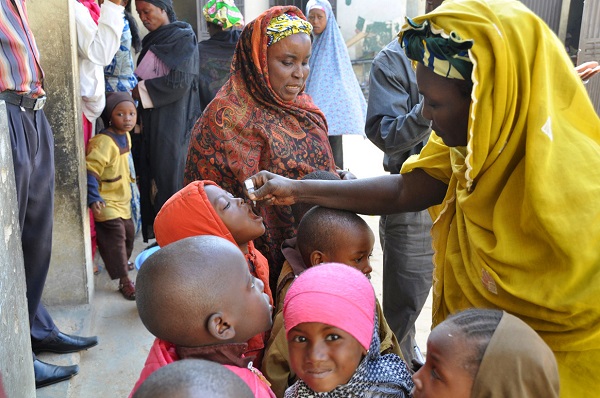
United Nations Children’s Fund (UNICEF) has said over 121 children have been infected with environmental poliovirus across Nigeria.
The UNICEF country representative, Peter Hawkins, made this known during the 3rd quarterly Northern Traditional Leaders’ Committee (NTLC) meeting on primary health care (PHC) delivery yesterday in Abuja, saying more than half of the states had recorded at least one case.
He, however, expressed the hope that the country would come out of the outbreak in no time due to the country’s good immunization infrastructure.
While noting that Nigeria accounts for 70 per cent of polio cases across the African continent, he added that 78 million vaccines had already been utilized throughout the country and 50 million more were expected in the next months to counter the outbreak.
“They are implementing the outbreak response to contain the spread of the virus just as we fought wild poliovirus together before, we need to fight the pandemic, polio and strengthen routine immunization,” he added.
In his remarks, the executive director, National Primary Health Care Development Agency (NPHCDA), Dr. Faisal Shuaib, said he was hopeful the situation would be brought under control, adding there was a clear distinction between the wild poliovirus which was eradicated from Nigeria and the entire African continent, and the current outbreak of different types of poliovirus.
“With the different disease outbreaks that we are currently contending with, it is imperative that our approach becomes more integrated. This is because they are all interwoven. Amidst COVID-19, we have Cholera, CVDPV2 which is a result of suboptimal routine immunization in some parts of the country.
“As we conduct outbreak response campaigns, we need to find a way to integrate our responses for efficient utilization of available resources and to enhance confidence in our people. The integration will also enhance our determination to continue to safeguard our wild polio virus-free status.
“This is a virus that exists where there is low routine immunization care, where women don’t take their kids for immunization shot against polio, measles and yellow fever-like our parents back then used to do,” he said.
He maintained that the poliovirus has the potential to start mutating like COVID-19 variants where there is no full routine immunization, potable water or poor sanitation.
“We would be able to mount outbreak responses to make sure that the tools that we are using will ensure that this outbreak stood. We are in control of the situation, hopefully, before the end of the rainy season, we will be able to carry out enough campaigns to make sure we are able to cover this.
“One other thing that is going to help us to ensure we don’t see this attack again is the increase in immunization coverage. Since 2016 where we recorded 33 per cent of routine immunization it has now increased to about 71 per cent and doubled the routine immunization coverage, we still have to get to about 90 per cent before we stop seeing these outbreaks of these diseases.
“We are not there yet, but the unprecedented increase in routine immunization coverage is going to help us. One thing that is clear is that globally there has never been such an increase in routine immunization coverage like we are seeing in Nigeria,” he added.
Earlier, the World Health Organization (WHO) country representative, Dr. Walter Mulombo, commended efforts of the northern traditional leaders in ensuring primary health care services remains a priority in order to reduce the risk of preventable diseases and death in communities, noted that
Similarly, the director of immunization, US Centers for Disease Control and Prevention (CDC), Dr. Omotayo Bolu, said Nigeria has one of the highest numbers of children with CVDPV2 and also the highest number of unimmunized children globally.
She urged the traditional leaders to prevail on their subjects to bring their children for routine immunizations.
“We have been successful in getting Nigeria out of wild poliovirus, you can help us break the transmission,” she added


